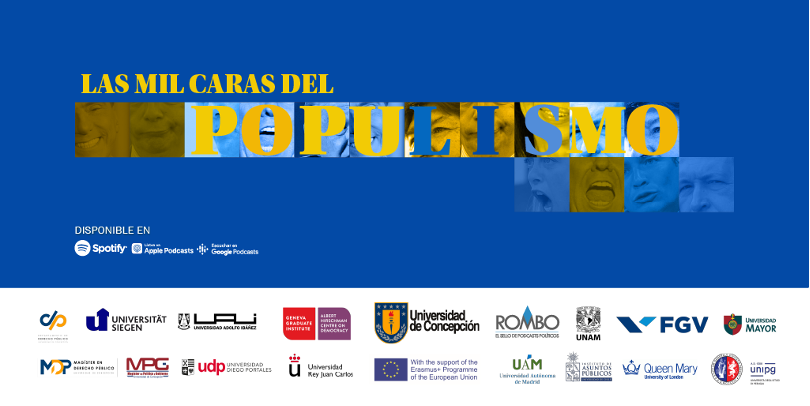Is the concept of populism the best to synthesizes the political essence of the 21st century? Is it useful to explain to somehow similar political processes at a global level? Is populism a strategy to attract voters, a political style or discourse, or is it an ideology? What consequences, negative and/or positive does it have on representative democracy? There is one clear certainty: there is a lot to learn about it.

The thousand faces of populism is a podcast for scientific dissemination based on the academic production of the Jean Monnet project of the European Union: Impact, risks and opportunities of populism in Europe and Latin America. An initiative within the Program of European Studies" of the University of Concepción (Chile) led by Paulina Astroza Suárez, with the participation of the Albert Hirschman Democracy Center, Graduate Institute (Geneva, Switzerland).
This podcast series seeks to convey the key features and policy dimensions that are useful to understand the populist phenomena. Its objective is to disseminate academic insights from the Jean Monnet project to a broader audience, drawing on an attractive format that combines the analysis of experts with archive files to answer a specific question in each episode (in Spanish). It is a Rombo Podcasts production. Conducted by Yanina Welp (AHDC) and Franco Delle Donne.
Trailer: The thousand faces of populism. An X-ray of the most commented political phenomenon of the last 100 years.
Episode 1: ¿Seguimos hablando de populismo? (Should we keep talking about populism?) Populism is analyzed here as both a historiographical and as a political category. The extent to which the different empirical manifestations of populism challenge current democracies is raised. It is illustrated with several cases and in particular with the Mexican one. Interviewees: Paulina Astroza, Cristobal Bellolio, Luis Huacuja
Episode 2: ¿Una demanda democratizadora? (A democratizing demand?) What relationship exists between the populist supply and the demand of society? Do voters of populist leadership have specific characteristics, in comparison to the median voter? How much do contexts matter? What is the dynamic towards democratization and/or de-democratization that begins when populists occupy the government? Interviewees: Cristóbal Rovira Kaltwasser and Javier Sajuria.
Episode 3: ¿Existe una política exterior populista? (Is there a populist foreign policy?) In the notion of the people that populism claims, the nation is central. What happens in those scenarios with foreign policy? What role does ideology play and how important is the context and strategic objectives? Whyich can of differences emerge when comparing Europe and Latin America? Interviewees: Susanne Gratius and Leslie Wehner.
Episode 4: ¿Puede la Justicia parar al populismo? (Can the Judiciary stop populism?) In populist governments, a typical adversary often turned into an enemy is the Judiciary. It is not a simple issue, because the Judiciary in some countries does not enjoy prestige. Interviewees: Beatriz Larraín and Susana Sanz.
Episode 5: ¿Una batalla cultural? (A culture battle?) Multiplicity of spokespeople for the radical right, paleolibertarians, ultra-conservative leaders, populists from the left and from the right wage battle on the plane of ideas, of thought, of the dispute for meaning. In the 21st century, what cultural battle are we talking about? Interviewees: Jeanne Simon, Thomas Sparrow, Luis Huacuja, Ignacio Molina, Javier Sajuria and Paulina Astroza.


